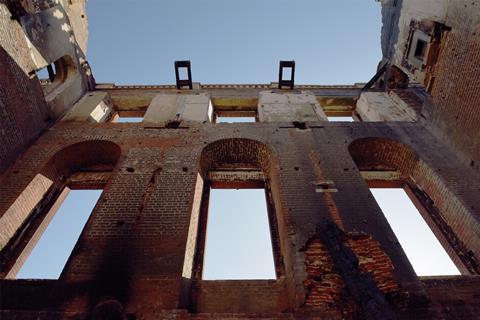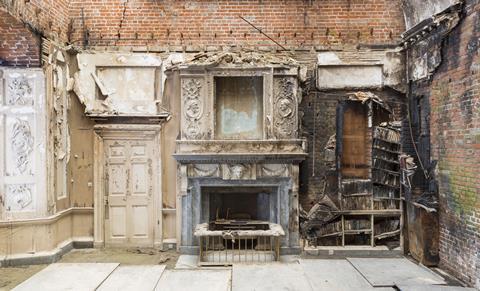Blaze in 2015 gutted grade I-listed property near Guildford
A Surrey contractor has been accused of botching building work that led to one of the National Trust’s most prestigious properties being gutted by fire and the charity facing a £115m repair bill.
The grade I-listed Clandon Park, near Guildford in Surrey, caught fire in April 2015 and was one of the country’s finest examples of Palladian architecture having been completed in the early eighteenth century by Venetian architect Giacomo Leoni.

But the building, which was acquired by the National Trust in the 1950s and extensively restored a decade later, was ravaged by the fire which was caused by a fault on an electricity distribution board in a cupboard in the basement of the home.
According to a writ filed at the Technology and Construction Court, the fire took just 40 minutes to spread from the basement to the roof of the house.
In its claim, the charity said the £115m repair bill it was now facing was a conservative estimate and added: “Owing to the unique nature of the property and the highly sensitive nature of the restoration work that will be required, [the National Trust’s] losses have not yet been fully quantified but the claimant estimates that they will exceed £115m.”
In its claim, the National Trust alleges Surbiton building contractor Cuffe plc and co-defendant Tuffin Ferraby Taylor (TRT), a London-based firm of building surveyors, were at fault over a lift shaft the pair worked on a decade earlier in a contract worth £181,000 to Cuffe.
It says the lift shaft was not built in accordance with building regulations and fire safety standards and did not offer any protection against fire – allowing the blaze to spread swiftly.
Its claim adds: “[The fire] spread because of the defendants’ breaches of duty in respect of the design and/or construction of a lift shaft near the cupboard, which, owing to those breaches, had no, or no adequate, fire resistance.”
It alleges Cuffe “fail[ed] to carry out the lift works it undertook with due diligence and/or in a good and workmanlike manner and/or with reasonable care and skill, exposing the Trust to the risk of a fire spreading through the House”. TRT is accused of “failing to exercise the degree of care and skill that would be expected of a reasonably competent” firm.
The National Trust said, following the fire, which destroyed hundreds of paintings, furniture and artefacts, the structure “remains little more than a shell”.
The writ added: “The fire started as a result of an electrical fault on the electricity distribution board. For the avoidance of doubt, it is not the Trust’s case that the defendants were responsible for the occurrence of this fault but they were and are responsible for the fact that the Fire was able to spread to affect the whole of the Home.”
The National Trust said the damage from the fire “would have been minimal and/or very significantly reduced” if the lift shaft had been properly built and able to resist fire for at least one hour, in line with regulations.
But it said the lift shaft contained “timber, plywood or other combustible elements which could aid in the spread of fire”.
It alleges Cuffe used plasterboard in the shaft – instead of fire-resistant materials that had been specified as necessary to achieve one hour’s fire resistance – and there was no evidence of any adequate fire prevention features.
And it said TFT failed to produce a specification or drawings “which included sufficiently detailed information and instructions for fire-resisting and/or fire-stopping measures”.
In a statement, Cuffe said: “Cuffe has recently served its defence to the allegations made by NT and denies any liability in relation to the losses claimed by NT.”
A TFT spokesperson said: “TFT Consultants denies the unfounded allegations that have been made in this legal claim and will defend it vigorously and in its entirety.
“The vulnerability of this building in the event of a fire, and the potential for rapid fire spread through the building, was documented to National Trust some years prior to the fire. The cause of the fire is known to be a defective electrical distribution board in a basement cupboard (next to a stair well), which had no connection to any work by TFT and a building contractor. The legal action is focused on seeking to recover a contribution to the insurance losses, where previous attempts to recover from the parties responsible for the root cause of the fire appear to have failed.”
He added: “It is accepted by all sides that TFT Consultants did not cause the fire. The allegations that TFT has a responsibility for the extent of the fire are entirely misplaced and depend upon unsubstantiated analysis of how the fire spread throughout the building. We are confident that we will successfully defend this claim. The damages claimed are completely unsubstantiated.
“This is the first such claim brought against us in our 50-year history. We are justifiably proud of our record. We maintain good relations with National Trust itself, and indeed are presently working for National Trust on other projects.”
In a statement, the National Trust said: “Our insurers Zurich Municipal are pursuing legal action against third parties for the losses suffered at Clandon Park during the fire. The National Trust is providing support in that litigation and we cannot comment on any questions relating to the case.”
The National Trust’s claim also reveals that it is facing action from the trustees of an onsite museum, the Surrey Infantry Museum, exceeding £1.4m for loss of earnings while an onsite restaurant, which went into liquidation nearly three years ago, is also claiming £800,000 for loss of earnings.
A spokesperson for Zurich Municipal said: “Following the devastating fire at Clandon Park, we have been working closely with the National Trust on this complex claim. As legal proceedings with other parties are ongoing, we are unable to comment further at this stage.”
Three years ago, a team led by Allies and Morrison won the competition to restore and renovate Clandon Park. The National Trust, which said it rescued 1,200 objects from the fire, is expected to begin core conservation work by the middle of next year.
No date has yet been set for a court hearing.





























No comments yet